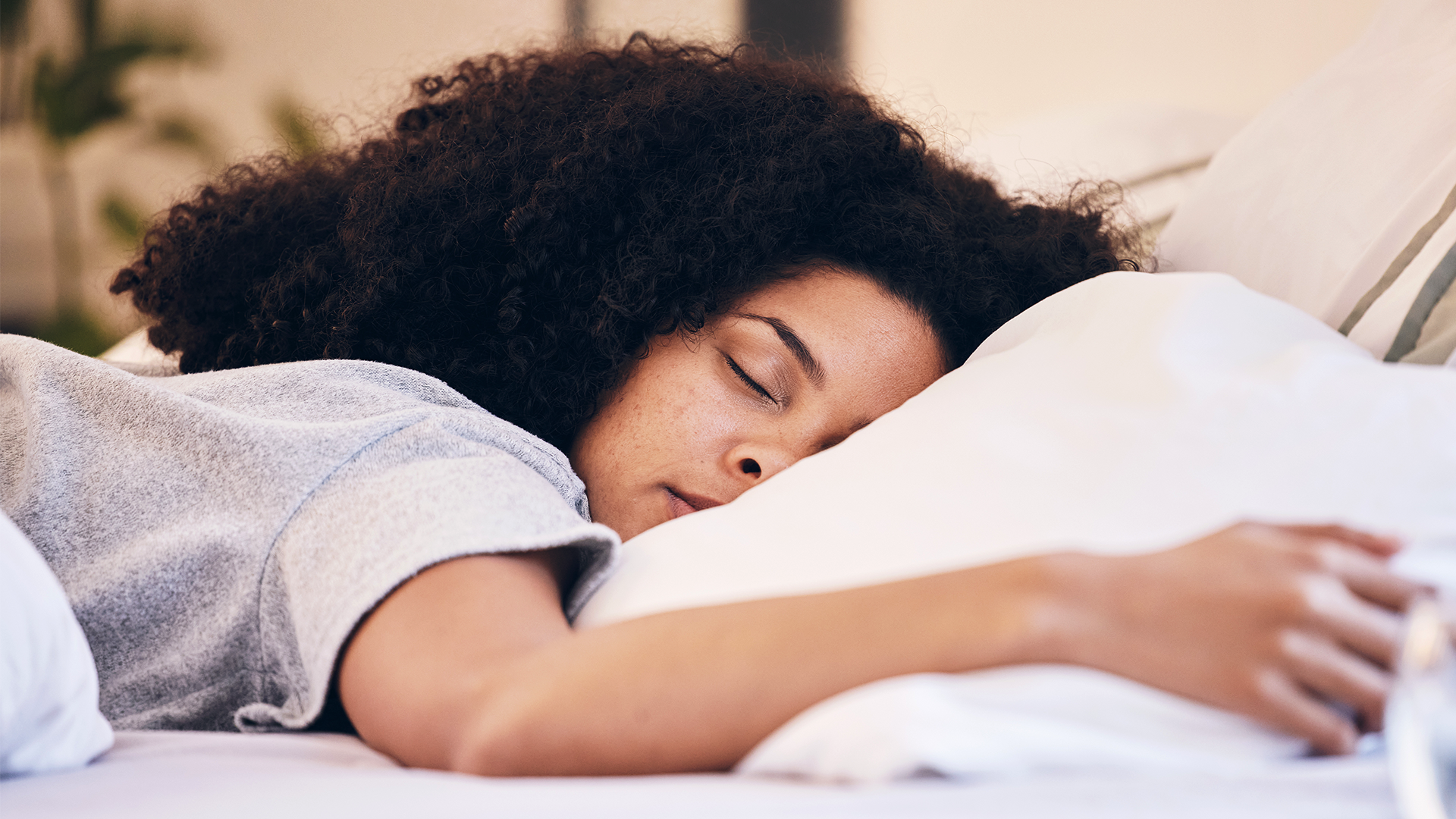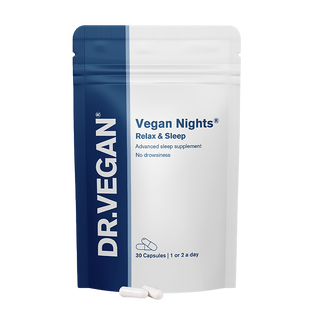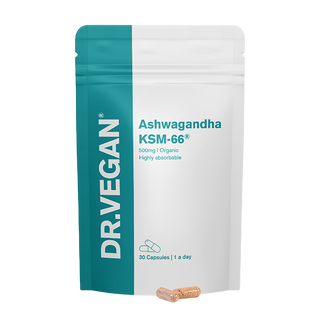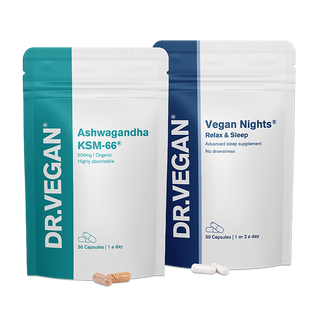How your diet can help your sleep

Having problems sleeping? You’re not alone! More than one in three adults suffer from poor sleep - that's according to the NHS and supported by DR.VEGAN's own consumer survey.
A consumer survey by DR.VEGAN® shows just 4% of people have no issues sleeping, and 73% of people struggle to sleep at least 3 nights a week. Past consumer surveys by DR.VEGAN® also highlighted the impact of a lack of exercise, stress, and our diet on how well you sleep. Research shows those doing no exercise each week are significantly more likely to suffer bad sleep compared to those who do 2-5 hours exercise each week, while people who have adjusted their diet from an 'eat everything' approach are less likely to suffer from poor sleep.
Does your diet help your sleep? Find out in your free Diet Profile.
How poor sleep affects you
An occasional poor night’s sleep is unlikely to have much of an impact on your health, however regularly not getting adequate quality sleep can increase your risk of obesity, heart disease and diabetes.
Sleep supports your immune system via 'cytokines' (proteins which target infection and inflammation) that your body produces when you’re sleeping. Too little sleep may amplify the ‘fight or flight’ response to stress, releasing stress hormones which speed up heart rate and raise blood pressure (The Sleep Council, 2020) and could worsen gut symptoms. Indeed, insomnia is one of the most common symptoms of poor gut health.
Vegan Nights®

You may also enjoy reading how to beat jet lag.
Vitamins to help you sleep well
Ashwagandha is one of the most common herbal remedies to support better sleep because of its effectiveness in lowering cortisol, your stress hormone that otherwise inhibits your body's production of melatonin, your sleep hormone. In addition, supplements such as the highly acclaimed Vegan Nights®, which includes Griffonia Seed Extract, Chamomile, L-Glycine and L-Theanine, are also very effective on their own or in combination with Ashwagandha to improve sleep.
However, there are also a number of essential vitamins and minerals you should be gaining in your diet to help your body and mind for better sleep.
Vitamin D3
A recent review found that people with low Vitamin D levels are more likely to suffer from poor sleep quality and shorter sleep duration. There is also some evidence that Vitamin D supplementation can improve sleep quality in those with sleep disorders. Learn more in 'How do I know if I'm deficient in Vitamin D?' which also highlights who is more at-risk of Vitamin D deficiency.
Magnesium
Magnesium is vital for your nervous system and regulates melatonin, your sleep hormone which also helps control your sleep-wake cycle. Getting adequate Magnesium has been shown to be positively associated with sleep duration. Magnesium is also excellent at relieving restless legs syndrome which is a common cause of poor sleep. Discover the causes of restless legs syndrome and how to manage it.
Good foods for Magnesium include pumpkin seeds, Brazil nuts, almonds and flaxseeds, wholemeal bread, spinach, peas, edamame beans, lentils, quinoa, fish, meat and dairy products. Learn more about why magnesium is so important.
Other vitamins and minerals that assist in the production and regulation melatonin include:
Vitamin B6: Found in pulses, lentils, bananas, soy foods and poultry. Vitamin B6 is vital for the normal functioning of your nervous system, psychological function and your energy metabolism, and is a key ingredient in our high strength B Vitamin Complex.
Calcium: Calcium is found in dairy products, tofu and fortified plant drinks. Learn more about calcium, which is also a vital ingredient for your bones & muscles.
Zinc: Found in whole grain bread, pumpkin and sesame seeds, cashews, cheese, shellfish and meat. You may also enjoy learning about why zinc is so important for your immunity, hair and skin.
Tryptophan: An amino acid found in tofu, soy foods, milk, peanuts, pumpkin seeds, as well as poultry, eggs, cheese, and oily fish.
Herbal teas
Herbal teas with Chamomile or Valerian root can have a beneficial effect on sleep for some people. Drinking a warm, malted drink may also help some people have a less restless sleep, although it must be noted the scientific reasons behind this are unclear.
What can cause poor sleep
Caffeine
Caffeine in coffee and tea stimulates the nervous system and makes you more alert. These drinks can be enjoyed in the morning, but switching to decaf coffee and tea after lunchtime is a useful strategy. Discover the best alternatives to caffeine.
Eating late in the evening
Eating late or having a very rich or spicy dinner may have a negative impact on your sleep as these foods can take longer to digest. Try eating earlier, or waiting at least 2-3 hours after your evening meal before going to bed. If you feel hungry before bed, have a small snack otherwise feeling hungry could be distracting when trying to sleep. You may be interested in reading 'What is 'social jet lag'?'.
Drinking too much fluid
It's an easy thing to forget, but drinking too much fluid in the evenings before you go to bed will increase your need to go to the bathroom during the night. Front-load your water consumption by drinking most of the recommended 2 litres of water a day in the morning and early afternoon, and taper your fluid intake in the evening.
Alcohol
Alcohol can often help you fall asleep initially, but lots of research shows it is linked with a poorer quality of sleep, more periods of wakefulness during the second half of the night, and a lighter sleep that is likely to make you feel groggy in the morning. You may also enjoy 'Is wine good for you?'.
View our range of award-winning vegan vitamins & supplements.
*This article contains data from UK surveys conducted by DR.VEGAN®. All survey findings reflect our own research efforts and have not been influenced or verified by any external organisations or third-party entities.
Want to hear more from our nutritionists? Sign up to our email newsletter for free tips and advice:
References
Gao et al (2018) The association between vitamin D deficiency and sleep disorders: A systematic review and meta-analysis. Available https://www.ncbi.nlm.nih.gov/pmc/articles/PMC6213953/
Ji et al (2017) The relationship between micronutrient status and sleep patterns: A systematic review. Public Health Nutrition. Available: https://www.ncbi.nlm.nih.gov/pmc/articles/PMC5675071/
NHS (2019). The risks of drinking too much. Available: https://www.nhs.uk/live-well/alcohol-support/the-risks-of-drinking-too-much/
NHS (2018) Why lack of sleep is bad for your health. Available: https://www.nhs.uk/live-well/sleep-and-tiredness/why-lack-of-sleep-is-bad-for-your-health/
Shahi Majid et al (2018) The effect of vitamin D supplement on the score and quality of sleep in 20-50 year-old people with sleep disorders compared with control group. Nutritional Neuroscience. Available: https://doi.org/10.1080/1028415X.2017.1317395
St-Onge et al. (2016) Effects of diet on sleep quality. Available: https://www.ncbi.nlm.nih.gov/pmc/articles/PMC5015038/
The Sleep Council (2020) Sleep Manifesto: The wake up call. Available: https://sleepcouncil.org.uk/wp-content/uploads/Manifesto.pdf



















